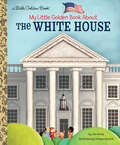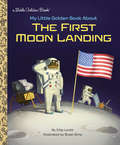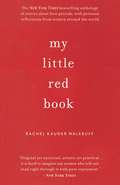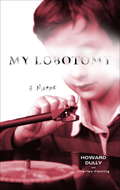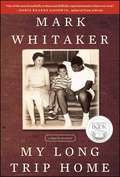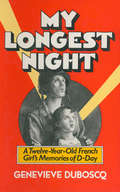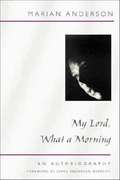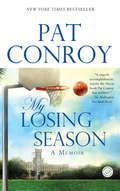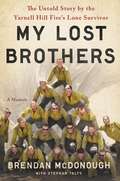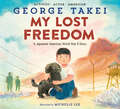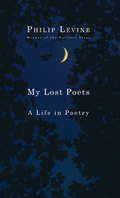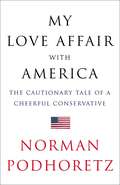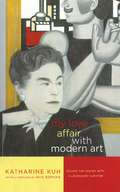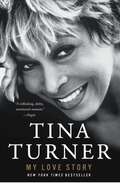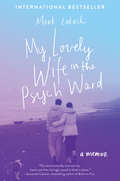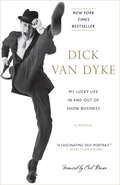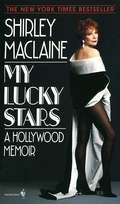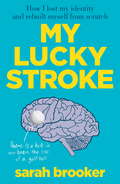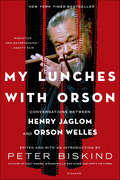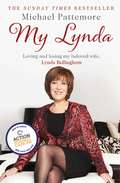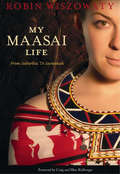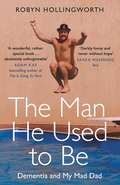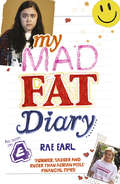- Table View
- List View
My Little Golden Book About The White House (Little Golden Book)
by Jen ArenaNow the littlest readers can learn about the White House--how it came to be, and what it's like to live there!In this engaging Little Golden Book, preschoolers will enjoy fascinating stories about the White House and some of the presidents, First Families, and even First Pets who have lived there. Simple words and bright artwork bring to life the story of how the White House came to be, and how it has changed over time. Little ones will learn that George Washington himself chose the building site, and that nearly every president has left his mark--from Thomas Jefferson's introduction of "water closets"--early toilets!--to Michelle Obama's vegetable garden. And kids will gain a clear understanding of the role the White House plays in American life and culture. Fun anecdotes about the rowdy Roosevelt children riding metal trays down the staircase, the annual Easter Egg Roll, and how the White House once kept cows for milk complete this charming nonfiction Little Golden Book.
My Little Golden Book About the First Moon Landing (Little Golden Book)
by Charles LovittThe exciting story of the Apollo 11 mission!In this engaging Little Golden Book, preschoolers will enjoy the fascinating story behind what happened on July 20, 1969, when two human beings walked on the moon for the very first time. Little ones will learn about the rocket Saturn V, the command module Columbia, and of course the famous lunar lander Eagle, and how they each served to send astronauts into space. Kids will learn who the astronauts were and how they were chosen for the mission. And they'll hear Neil Armstrong's unforgettable words in his message back to Earth: "one giant leap for mankind." Fun facts about the astronauts' space suits and their work in space round out this exciting picture book.
My Little Red Book
by Rachel Kauder NalebuffMY LITTLE RED BOOK is an anthology of stories about first periods, collected from women of all ages from around the world. The accounts range from light-hearted (the editor got hers while water skiing in a yellow bathing suit) to heart-stopping (a first period discovered just as one girl was about to be strip-searched by the Nazis). The contributors include well-known women writers (Meg Cabot, Erica Jong, Gloria Steinem, Cecily von Ziegesar), alongside today's teens. And while the authors differ in race, faith, or cultural background, their stories share a common bond: they are all accessible, deeply honest, and highly informative. Whatever a girl experiences or expects, she'll find stories that speak to her thoughts and feelings. Ultimately, MY LITTLE RED BOOK is more than a collection of stories. It is a call for a change in attitude, for a new way of seeing periods. In a time when the taboo around menstruation seems to be one of the few left standing, it makes a difficult subject easier to talk about, and helps girls feel proud instead of embarrassed or ashamed. By revealing what it feels like to undergo this experience first hand, and giving women the chance to explain their feelings in their own words, it aims to provide support, entertainment, and a starting point for discussion for mothers and daughters everywhere.It is a book every girl should have. Period.
My Liverpool Home: Dyed-in-the-Wool Red
by Kenny DalglishKenny Dalglish's relationship with Liverpool Football Club is one of the great love stories of sport. From the moment he first set foot in the Anfield dressing room nervously asking for autographs while having a trial at the club, Dalglish felt a passion for Liverpool stir within him. After joining from Celtic in 1977, the supremely gifted striker was embraced by Liverpool fans, for the goals and the glory, and most especially for the three European Cups. The Kop's adoration of King Kenny has never ebbed. Every game, they still sing his name. Liverpool fans have never forgotten how Dalglish held the club together through two tragedies, the first at the Heysel stadium in Brussels in 1985 and then at Hillsborough in 1989. Both disasters are explored at length and in emotional detail by Dalglish in My Liverpool Home. Eventually, for the sake of his health and his family, Dalglish resigned and Liverpool have not won the title since. Although Dalglish walked alone, away from Anfield, in his heart he never really left and has now finally returned, playing a pivotal role in this turbulent period in the club's history. My Liverpool Home is the story of Dalglish's epic love affair with Liverpool, tracing the highs and lows, the characters, the laughter, the triumphs and the many tears. For football fans, this revealing book about one of the game's greatest players is a must. For those fascinated by how a very private man suffered after very publicly supporting his community, Dalglish's emotional story makes compelling reading.
My Liverpool Home: Dyed-in-the-Wool Red
by Kenny DalglishKenny Dalglish's relationship with Liverpool Football Club is one of the great love stories of sport. From the moment he first set foot in the Anfield dressing room nervously asking for autographs while having a trial at the club, Dalglish felt a passion for Liverpool stir within him. After joining from Celtic in 1977, the supremely gifted striker was embraced by Liverpool fans, for the goals and the glory, and most especially for the three European Cups. The Kop's adoration of King Kenny has never ebbed. Every game, they still sing his name. Liverpool fans have never forgotten how Dalglish held the club together through two tragedies, the first at the Heysel stadium in Brussels in 1985 and then at Hillsborough in 1989. Both disasters are explored at length and in emotional detail by Dalglish in My Liverpool Home. Eventually, for the sake of his health and his family, Dalglish resigned and Liverpool have not won the title since. Although Dalglish walked alone, away from Anfield, in his heart he never really left and has now finally returned, playing a pivotal role in this turbulent period in the club's history. My Liverpool Home is the story of Dalglish's epic love affair with Liverpool, tracing the highs and lows, the characters, the laughter, the triumphs and the many tears. For football fans, this revealing book about one of the game's greatest players is a must. For those fascinated by how a very private man suffered after very publicly supporting his community, Dalglish's emotional story makes compelling reading.
My Lobotomy: A Memoir
by Howard Dully Charles FlemingAt twelve, Howard Dully was guilty of the same crimes as other boys his age: he was moody and messy, rambunctious with his brothers, contrary just to prove a point, and perpetually at odds with his parents. Yet somehow, this normal boy became one of the youngest people on whom Dr. Walter Freeman performed his barbaric transorbital—or ice pick—lobotomy.<P><P> Abandoned by his family within a year of the surgery, Howard spent his teen years in mental institutions, his twenties in jail, and his thirties in a bottle. It wasn’t until he was in his forties that Howard began to pull his life together. But even as he began to live the “normal” life he had been denied, Howard struggled with one question: Why?<P> “October 8, 1960. I gather that Mrs. Dully is perpetually talking, admonishing, correcting, and getting worked up into a spasm, whereas her husband is impatient, explosive, rather brutal, won’t let the boy speak for himself, and calls him numbskull, dimwit, and other uncomplimentary names.”<P> There were only three people who would know the truth: Freeman, the man who performed the procedure; Lou, his cold and demanding stepmother who brought Howard to the doctor’s attention; and his father, Rodney. Of the three, only Rodney, the man who hadn’t intervened on his son’s behalf, was still living. Time was running out. Stable and happy for the first time in decades, Howard began to search for answers. <P> “December 3, 1960. Mr. and Mrs. Dully have apparently decided to have Howard operated on. I suggested [they] not tell Howard anything about it.”<P> Through his research, Howard met other lobotomy patients and their families, talked with one of Freeman’s sons about his father’s controversial life’s work, and confronted Rodney about his complicity. And, in the archive where the doctor’s files are stored, he finally came face to face with the truth.<P> Revealing what happened to a child no one—not his father, not the medical community, not the state—was willing to protect, My Lobotomy exposes a shameful chapter in the history of the treatment of mental illness. Yet, ultimately, this is a powerful and moving chronicle of the life of one man. Without reticence, Howard Dully shares the story of a painfully dysfunctional childhood, a misspent youth, his struggle to claim the life that was taken from him, and his redemption.
My Long Trip Home
by Mark WhitakerIn a dramatic, moving work of historical reporting and personal discovery, Mark Whitaker, award-winning journalist, sets out to trace the story of what happened to his parents, a fascinating but star-crossed interracial couple, and arrives at a new understanding of the family dramas that shaped their lives--and his own. His father, "Syl" Whitaker, was the charismatic grandson of slaves who grew up the child of black undertakers from Pittsburgh and went on to become a groundbreaking scholar of Africa. His mother, Jeanne Theis, was a shy World War II refugee from France whose father, a Huguenot pastor, helped hide thousands of Jews from the Nazis and Vichy police. They met in the mid-1950s, when he was a college student and she was his professor, and they carried on a secret romance for more than a year before marrying and having two boys. Eventually they split in a bitter divorce that was followed by decades of unhappiness as his mother coped with self-recrimination and depression while trying to raise her sons by herself, and his father spiraled into an alcoholic descent that destroyed his once meteoric career. Based on extensive interviews and documentary research as well as his own personal recollections and insights, My Long Trip Home is a reporter's search for the factual and emotional truth about a complicated and compelling family, a successful adult's exploration of how he rose from a turbulent childhood to a groundbreaking career, and, ultimately, a son's haunting meditation on the nature of love, loss, identity, and forgiveness.
My Longest Night: A Twelve-Year-Old French Girl's Memories of D-Day
by Genevieve Duboscq&“In a childlike style that reflects the excitement of those dramatic, danger-filled days,&” a young French girl portrays her heroism during World War II (Publishers Weekly). Such was the sleepy nature of the Normandy town of Sainte-Mère-Église and such was the hostile nature of the &“vast area of marshes and lowlands&” surrounding it, that it seemed immune from the terror and chaos of war. Indeed, it seemed hard to imagine the local people ever hearing more than the distant rumblings of war or suffering more than those minor discomforts and humiliations which plague a rural community largely left alone by an Army of Occupation. The evening of June 5th, 1944 seemed like any other, yet for Geneviève Duboscq, not yet twelve, and her five-year-old brother, that evening would become their longest night—one they would never forget. An American paratrooper appeared on the Duboscq&’s doorstep quickly followed by other battered emissaries of freedom. The Duboscq&’s house became an emergency shelter; their knowledge of the region the difference between life and death, success and failure to those liberators from the sky. My Longest Night, with exemplary simplicity and poignancy, depicts D-Day and what followed in a way that it has never been presented before. Geneviève Dubsocq emerges as a remarkable young woman whose story will touch the hearts and minds of all who read it.&“One of the most personal descriptions of D-Day that we are likely to have.&” —Christian Science Monitor
My Lord, What a Morning
by Marian AndersonMy Lord, What A Morning is a tender and engrossing memoir, abounding with the tender and inspiring memories of Marian Anderson's life in her modest words. From her humble but proud beginnings in South Philadelphia to international vocal renown, the legendary contralto writes of triumph and adversity.
My Losing Season: A Memoir
by Pat ConroyPAT CONROY--AMERICA'S MOST BELOVED STORYTELLER--IS BACK! "I was born to be a point guard, but not a very good one. . . .There was a time in my life when I walked through the world known to myself and others as an athlete. It was part of my own definition of who I was and certainly the part I most respected. When I was a young man, I was well-built and agile and ready for the rough and tumble of games, and athletics provided the single outlet for a repressed and preternaturally shy boy to express himself in public....I lost myself in the beauty of sport and made my family proud while passing through the silent eye of the storm that was my childhood." So begins Pat Conroy's journey back to 1967 and his startling realization "that this season had been seminal and easily the most consequential of my life." The place is the Citadel in Charleston, South Carolina, that now famous military college, and in memory Conroy gathers around him his team to relive their few triumphs and humiliating defeats. In a narrative that moves seamlessly between the action of the season and flashbacks into his childhood, we see the author's love of basketball and how crucial the role of athlete is to all these young men who are struggling to find their own identity and their place in the world. In fast-paced exhilarating games, readers will laugh in delight and cry in disappointment. But as the story continues, we gradually see the self-professed "mediocre" athlete merge into the point guard whose spirit drives the team. He rallies them to play their best while closing off the shouts of "Don' t shoot, Conroy" that come from the coach on the sidelines. For Coach Mel Thompson is to Conroy the undermining presence that his father had been throughout his childhood. And in these pages finally, heartbreakingly, we learn the truth about the Great Santini. In My Losing Season Pat Conroy has written an American classic about young men and the bonds they form, about losing and the lessons it imparts, about finding one's voice and one's self in the midst of defeat. And in his trademark language, we see the young Conroy walk from his life as an athlete to the writer the world knows him to be. BONUS: This edition includes an excerpt from Pat Conroy's The Death of Santini.
My Lost Brothers: The Untold Story by the Yarnell Hill Fire's Lone Survivor
by Stephan Talty Brendan McdonoughA gripping first-person account by the sole survivor of Arizona's disastrous 2013 Yarnell Hill Fire, which took the lives of 19 "hotshots"--firefighters trained specifically to battle wildfires.Brendan McDonough was on the verge of becoming a hopeless, inveterate heroin addict when he, for the sake of his young daughter, decided to turn his life around. He enlisted in the Granite Mountain Hotshots, a team of elite firefighters based in Prescott, Arizona. Their leader, Eric Marsh, was in a desperate crunch after four hotshots left the unit, and perhaps seeing a glimmer of promise in the skinny would-be recruit, he took a chance on the unlikely McDonough, and the chance paid off. Despite the crew's skepticism, and thanks in large part to Marsh's firm but loving encouragement, McDonough unlocked a latent drive and dedication, going on to successfully battle a number of blazes and eventually win the confidence of the men he came to call his brothers.Then, on June 30, 2013, while McDonough--"Donut" as he'd been dubbed by his team--served as lookout, they confronted a freak, 3,000-degree inferno in nearby Yarnell, Arizona. The relentless firestorm ultimately trapped his hotshot brothers, tragically killing all 19 of them within minutes. Nationwide, it was the greatest loss of firefighter lives since the 9/11 attacks. My Lost Brothers is a gripping memoir that traces McDonough's story of finding his way out of the dead end of drugs, finding his purpose among the Granite Mountain Hotshots, and the minute-by-minute account of the fateful day he lost the very men who had saved him. A harrowing and redemptive story of resilience in the face of tragedy, My Lost Brothers is also a powerful reminder of the heroism of the people who put themselves in harm's way to protect us every day.
My Lost Freedom: A Japanese American World War II Story
by George Takei Michelle LeeA moving, beautifully illustrated true story for children ages 6 to 9 about growing up in Japanese American incarceration camps during World War II—from the iconic Star Trek actor, activist, and author of the New York Times bestselling graphic memoir They Called Us Enemy. <P><P> February 19, 1942. George Takei is four years old when his world changes forever. Two months after the bombing of Pearl Harbor, President Franklin D. Roosevelt declares anyone of Japanese descent an enemy of the United States. <P><P> George and his family were American in every way. They had done nothing wrong. But because of their Japanese ancestry, they were removed from their home in California and forced into camps with thousands of other families who looked like theirs. <P><P> Over the next three years, George had three different “homes”: the Santa Anita racetrack, swampy Camp Rohwer, and infamous Tule Lake. But even though they were now living behind barbed wire fences and surrounded by armed soldiers, his mother and father did everything they could to keep the family safe. <P><P> In My Lost Freedom, George Takei looks back at his own memories to help children today understand what it feels like to be treated as an enemy by your own country. Featuring powerful, meticulously researched watercolor paintings, this is a story of a family’s courage, a young boy’s resilience, and the importance of staying true to yourself in the face of injustice. <P><P><i>Advisory: Bookshare has learned that this book offers only partial accessibility. We have kept it in the collection because it is useful for some of our members. Benetech is actively working on projects to improve accessibility issues such as these.</i> <p> <b>New York Times Bestseller</b>
My Lost Poets: A Life in Poetry
by Philip LevineEssays, speeches, and journal entries from one of our most admired and best-loved poets that illuminate how he came to understand himself as a poet, the events and people that he wrote about, and the older poets who influenced him. In prose both as superbly rendered as his poetry and as down-to-earth and easy as speaking, Levine reveals the things that made him the poet he became. In the title essay, originally the final speech of his poet laureate year, he recounts how as a boy he composed little speeches walking in the night woods near his house and how he later realized these were his first poems. He wittily takes on the poets he studied with in the Iowa Writing Program: John Berryman, who was his great teacher and lifelong friend, and Robert Lowell, who was neither. His deepest influences--jazz, Spain, the working people of Detroit--are reflected in many of the pieces. There are essays on Spanish poets he admires, William Carlos Williams, Wordsworth, Keats, and others. A wonderful, moving collection of writings that add to our knowledge and appreciation of Philip Levine--both the man and the poet.From the Hardcover edition.
My Love Affair with America
by Norman PodhoretzIn this touching and delightful memoir, Norman Podhoretz charts the ups and downs of his lifelong love affair with his native land, and warns that to turn against America, from the Right no less than from the Left, is to fall into the rankest ingratitude. While telling the story of how he himself grew up to be a fervent patriot, one of this country's leading conservative thinkers urges his fellow conservatives to rediscover and reclaim their faith in America. A superb storyteller, Podhoretz takes us from his childhood as a working-class kid in Brooklyn during the Great Depression -- the son of Jewish immigrants singing Catholic hymns in a public school staffed by Irish spinsters and duking it out on the streets with his black and Italian classmates -- to his later education, his shifting political alliances, and his arrival at a happy personal and intellectual resolution. My Love Affair with America shows us a gentler and funnier Podhoretz than readers have seen before. At the same time, it presents a picture of someone eager to proclaim, against all comers, that America represents one of the high points in the history of human civilizations. In this powerful, elegantly written, and poignant cautionary tale, Podhoretz pleads with his fellow conservatives not to fall, as some have lately done, into their own special brand of anti-Americanism, as he reminds them of the disastrous consequences that followed the assault by the New Left against the United States in decades gone by. Warm in feeling and brilliantly perceptive, My Love Affair with America points the way back to a thoroughly unabashed love of country -- the kind of patriotism that has rarely been encountered in recent years and that is as invigorating as it is inspiring.
My Love Affair with Modern Art: Behind the Scenes with a Legendary Curator
by Katharine Kuh Avis BermanOne of America's leading curators, "a woman of resilience and vision, a writer of clarity and ardor" (Chicago Tribune), takes you on a personal tour of the world of modern art. In the Depression-era climate of the 1930s, Katharine Kuh defied the odds and opened a gallery in Chicago, where she exhibited such relatively unknown artists as Fernand Léger, Paul Klee, Joan Miró, Ansel Adams, Marc Chagall, and Alexander Calder. Her extraordinary story reveals how and why America became a major force in the world of contemporary art.
My Love Story: A Memoir
by Tina TurnerIn this New York Times bestseller, Tina Turner—the long-reigning queen of rock & roll and living legend—reveals personal stories she&’s never told before in print or film, about her complicated relationship with her mother, the tragic death of her son, and finally finding true love with Erwin, setting the record straight about her illustrious career in this eye-opening and compelling memoir. From her early years in Nutbush, Tennessee to her rise to fame alongside Ike Turner to her phenomenal success in the 1980s and beyond, Tina candidly examines her personal history, from her darkest hours to her happiest moments and everything in between. My Love Story is an explosive and inspiring story of a woman who dared to break any barriers put in her way. Emphatically showcasing Tina&’s signature blend of strength, energy, heart, and soul, this is a gorgeously wrought memoir as enthralling and moving as any of her greatest hits.
My Lovely Wife in the Psych Ward: A Memoir
by Mark LukachA heart-wrenching, yet hopeful, memoir of a young marriage that is redefined by mental illness and affirms the power of love.Mark and Giulia’s life together began as a storybook romance. They fell in love at eighteen, married at twenty-four, and were living their dream life in San Francisco. When Giulia was twenty-seven, she suffered a terrifying and unexpected psychotic break that landed her in the psych ward for nearly a month. One day she was vibrant and well-adjusted; the next she was delusional and suicidal, convinced that her loved ones were not safe. Eventually, Giulia fully recovered, and the couple had a son. But, soon after Jonas was born, Giulia had another breakdown, and then a third a few years after that. Pushed to the edge of the abyss, everything the couple had once taken for granted was upended. A story of the fragility of the mind, and the tenacity of the human spirit, My Lovely Wife in the Psych Ward is, above all, a love story that raises profound questions: How do we care for the people we love? What and who do we live for? Breathtaking in its candor, radiant with compassion, and written with dazzling lyricism, Lukach’s is an intensely personal odyssey through the harrowing years of his wife’s mental illness, anchored by an abiding devotion to family that will affirm readers’ faith in the power of love.
My Lucky Life In and Out of Show Business
by Dick Van Dyke<P>Dick Van Dyke, indisputably one of the greats of the golden age of television, is admired and beloved by audiences the world over for his beaming smile, his physical dexterity, his impeccable comic timing, his ridiculous stunts, and his unforgettable screen roles. His trailblazing television program, The Dick Van Dyke Show (produced by Carl Reiner, who has written the foreword to this memoir), was one of the most popular sitcoms of the 1960s and introduced another major television star, Mary Tyler Moore. <P>But Dick Van Dyke was also an enormously engaging movie star whose films, including Mary Poppins and Chitty Chitty Bang Bang, have been discovered by a new generation of fans and are as beloved today as they were when they first appeared. Who doesn't know the word supercalifragilisticexpialidocious? <P>A colorful, loving, richly detailed look at the decades of a multi-layered life, My Lucky Life In and Out of Show Business, will enthrall every generation of reader, from baby-boomers who recall when Rob Petrie became a household name, to all those still enchanted by Bert's "Chim Chim Cher-ee." This is a lively, heartwarming memoir of a performer who still thinks of himself as a "simple song-and-dance man," but who is, in every sense of the word, a classic entertainer. <P><b>A New York Times Bestseller</b>
My Lucky Stars: A Hollywood Memoir
by Shirley MaclaineAn Academy Award-winning actress and the internationally bestselling author of Out on a Limb delivers her touching, warm, and headline-making memoir. In My Lucky Stars Shirley MacLaine talks candidly and personally about her four decades in Hollywood, especially about the men and women--her "lucky stars"--who touched and challenged her life. (From the Paperback edition.)
My Lucky Stroke
by Sarah BrookerSarah Brooker was an ambitious young woman studying to be a neuroscientist. She had the world at her feet. On New Year?s Eve, 2002, an unbelievable series of events occurred: a brain aneurysm, a devastating car accident, a body broken and a mind shattered. A life was changed forever. Several weeks later Sarah woke from a coma with no idea of who or where she was or what had happened. But thanks to an extraordinary quirk of the brain, Sarah could remember neuroscience. In fact, when doctors came to visit her during the many months she spent in hospital, Sarah assumed they were consulting her as the brain expert, not attending to her as a patient. My Lucky Stroke is an extraordinary memoir, full of life and insight, humour and drama, a story about rebuilding a life from square one that you won?t easily forget.
My Lunches with Orson: Conversations between Henry Jaglom and Orson Welles
by Peter BiskindBased on long-lost recordings between Orson Welles and Henry Jaglom, My Lunches with Orson presents a set of riveting and revealing conversations with America's great cultural provocateur.There have long been rumors of a lost cache of tapes containing private conversations between Orson Welles and his friend the director Henry Jaglom, recorded over regular lunches in the years before Welles died. The tapes, gathering dust in a garage, did indeed exist, and this book reveals for the first time what they contain.Here is Welles as he has never been seen before: talking intimately, disclosing personal secrets, reflecting on the highs and lows of his astonishing Hollywood career, the people he knew—FDR, Winston Churchill, Charlie Chaplin, Marlene Dietrich, Laurence Olivier, David Selznick, Rita Hayworth, and more—and the many disappointments of his last years. This is the great director unplugged, free to be irreverent and worse—sexist, homophobic, racist, or none of the above— because he was nothing if not a fabulator and provocateur. Ranging from politics to literature to movies to the shortcomings of his friends and the many films he was still eager to launch, Welles is at once cynical and romantic, sentimental and raunchy, but never boring and always wickedly funny.Edited by Peter Biskind, America's foremost film historian, My Lunches with Orson reveals one of the giants of the twentieth century, a man struggling with reversals, bitter and angry, desperate for one last triumph, but crackling with wit and a restless intelligence. This is as close as we will get to the real Welles—if such a creature ever existed.
My Lynda: Loving and losing my beloved wife, Lynda Bellingham
by Michael PattemoreLynda Bellingham died in her husband Michael's arms on 19th October 2014. Lynda touched many lives in her memoir, There's Something I've Been Dying to Tell You, and in My Lynda, Michael tells his side of the story. He talks movingly about their ten years together and describes how, in the past year, he has struggled to cope. He shares candidly his experience of grief, offering hope and support to others who have lost partners and loved ones. His is a book to comfort those who loved Lynda, to tell the missing pieces of their life together, to write about how they both confronted the news of her illness, and how he managed to continue since that moment of hearing that she had a teminal illness.
My Maasai Life
by Robin WiszowatyGrowing up in suburban Illinois, Robin Wiszowaty leads a typical middle-class American life. Hers is a world of gleaming shopping malls, congested freeways, and neighborhood gossip. But from an early age, she has longed to break free of this existence and discover something deeper. What it is, she doesn't quite know. Yet she knows in her heart there simply has to be more.Through a fortunate twist of fate, Robin seizes an opportunity to travel to rural Kenya and join an impoverished Maasai community. Suddenly her days are spent hauling water, evading giraffes, and living in a tiny hut made of cow dung with her adoptive family. She is forced to face issues she's never considered: extreme poverty, drought, female circumcision, corruption - and discovers love in the most unexpected places. In the open wilds of the dusty savannah, this Maasai life is one she could never have imagined.
My Mad Dad: The Diary of an Unravelling Mind
by Robyn HollingworthInadvertent cross-dressing Attempted murder Jail break A waltz at a funeral A hernia the size of GuernseyHeartbreaking and darkly comic, these are the moments that litter the messy road from cared-for to carer, a journey that Robyn Hollingworth finds herself on when she's only twenty-five years old. Leaving London to return home to rural South Wales, Robyn finds that it's her old life - same teddy bears resting on her pillow, their bodies tucked under the duvet; same view of the garages behind which she'd had her first cigarette and first kiss - but so much has changed. Her dad, the proud, charmingly intelligent, self-made man who made people laugh, is in the grip of early onset Alzheimer's. His brilliant mind, which saw him building power stations and literally bringing light into the lives of others, has succumbed to darkness. As Robyn settles back in the rhythms of life in the rain-soaked vast Welsh valleys, she keeps a diary charting her journey as the dad she knew disappears before her eyes. Lyrical, poignant and with flashes of brilliant humour, My Mad Dad explores how in helping others we can heal ourselves. 'At some point the cared for become the carers...this isn't a shame and it isn't a tragedy and it isn't a chore. It is an honour. To be able to return the gift of love that someone bestows upon you is a gift in itself. This is a story of caring...'
My Mad Fat Diary
by Rae Earl**My Mad Fat Diary is now a hit comedy series on E4.**It's 1989 and Rae is a fat, boy-mad 17-year-old girl, living in Stamford, Lincolnshire with her mum and their deaf white cat in a council house with a mint off-green bath suite and a larder Rae can't keep away from. This is the hilarious and touching real-life diary she kept during that fateful year - with characters like her evil friend Bethany, Bethany's besotted boyfriend, and the boys from the grammar school up the road (who have code names like Haddock and Battered Sausage). My Mad Fat Diary evokes a vanished time when Charles and Di are still together, the Berlin wall is up, Kylie is expected to disappear from the charts at any moment and it's £1 for a Snakebite and Black in the Vaults pub. My Mad Fat Diary will appeal to anyone who's lived through the 1980s. But it will also strike a chord with anyone who's ever been a confused, lonely teenager who clashes with their mother, takes themselves VERY seriously and has no idea how hilarious they are.
